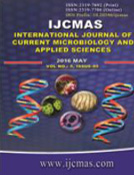


 National Academy of Agricultural Sciences (NAAS)
National Academy of Agricultural Sciences (NAAS)

|
PRINT ISSN : 2319-7692
Online ISSN : 2319-7706 Issues : 12 per year Publisher : Excellent Publishers Email : editorijcmas@gmail.com / submit@ijcmas.com Editor-in-chief: Dr.M.Prakash Index Copernicus ICV 2018: 95.39 NAAS RATING 2020: 5.38 |
This study aims to isolate and identify the aerobic bacterial pathogens of sterile body fluids excluding blood and to determine their susceptibility to various antimicrobial agents. Retrospective observational study was conducted in a tertiary care hospital between January 2014 to December 2015. With universal safety precautions, the sterile body fluids were collected and processed. Identification was done by standard protocols. The antimicrobial susceptibility testing was done for the isolates by Kirby Bauer’s Disk Diffusion method and MRSA detected and interpreted as per CLSI guidelines. Out of 115 Body fluids samples received for culture and sensitivity, most common received fluid were ascitic fluid 17(14.78%) followed by synovial fluid 08(6.95%), pleural fluid 07(6.09%), fluid from dialysis unit 04(3.5%),CSF & hydrocele 01(0.9%) each and others 77(66.95%).Among the 115 samples, 30(26.09%) showed gram stain positive, 17(14.78%) were culture positive and 98(85.22%) cultures sterile even after 48hrs of incubation. Of 17 culture positive samples, 10(85.22%) samples yielded gram positive cocci (GPC), 04 (57.14%) samples yielded Enterobactericeae and 03(42.86%) samples grew Non-fermenters. Among gram positive cocci, Staph aureus is the most common with 7(70%) samples yielding the organism followed by CONS in 02 (20%) samples. Among Enterobactericeae, E.coli is the predominant with 2(50%) isolates followed by Klebsiella spp (25%). Among Non-fermenters, we could isolate Pseudomonas aeruginosa in 03(100%) samples. Most of GPC were sensitive to Vancomycin, gentamicin & amikacin and least to clindamycin. Methicillin resistance in S. aureus was found to be 02 (28.57%). whereas most of GNB were sensitive to aminoglycosides & least to ampicillin. Low culture positivity may be due to presence of anaerobic; fastidious organisms with lack of enrichment techniques & prior antibiotic administrations. Regular monitoring of prevalent pathogenic organisms and their sensitivities will aid the clinicians in appropriate selection of antibiotic therapy in absence of a culture report and prevent the development of antibiotic resistance.
 |
 |
 |
 |
 |